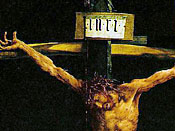Advent is heavy on themes.
Chief amongst these is preparation for Christmas.
Week by week we mark this passage (slow for children, but astonishingly fast for adults) with the lighting of candles on an Advent wreath.
It rather ticks the weeks off.
Though if we pay attention
it is not just about getting through the season
we are led carefully into the mystery of the life God has in store for us
the hope God has for you and me and for the world
and the sense of promise that is caught up in human life.
We 'intuit' a lot of this at Christmas time any way. With a strong sense of expectation at the great celebration, we need to also look for something more substantial
than a day of fun and feasting.
Advent tries to point us to go a little deeper so try and take time in this season
to absorb something of the ethos.
The prophets point us to a sense of political fulfilment.
For the people of Israel it was about peace and stability.
These things do not come without cost and without work,
there is not the suggestion that God will come and wave a magic wand
and all will be made well.
There is always a sense that if we are to enjoy peace
then God's people are to lead the way
so when we hear Jeremiah say:
The Lord will raise up a righteous branch who
shall execute justice and righteousness in the land.
We can also ask ourselves what this calls us to do
how do we, the righteous branch, grafted into Christ work for justice and righteousness here in Australia.
We are often very passive when it comes to politics
but where do we feel there is more need for justice
where can we strive for peace and stability.
This is of course part of the motivation
for the Christian to care for those in need
It is about fulfilling our Advent call.
for justice and righteousness
for peace and community
and not just sitting on the sidelines expecting something to happen.
In a way this is not rocket science.
Jesus reminds us with the example of the trees changing and growing
that there is a continuous cycle of growth, expectation, and fulfillment
and his reminder is that we should
‘Be on guard so that your hearts are not weighed down with dissipation and drunkenness and the worries of this life, and that day does not catch you unexpectedly, like a trap. For it will come upon all who live on the face of the whole earth. Be alert at all times, praying that you may have the strength to escape all these things that will take place, and to stand before the Son of Man.’
We should take the opportunity that we are given.
It is a recurring theme of his teaching
Be watchful and take the opportunity
So some Advent questions are
Am I in touch with what God is promising me?
Can I speak to God about what I hope for at this time in my life?
Is there some thing that I am called to do in this season
which furthers God's cause of justice, peace and righteousness?
What do I need to do to put that into action, or if I can't easily latch on to this idea
can I ask God for some direction.
The time is short...but the time is enough






